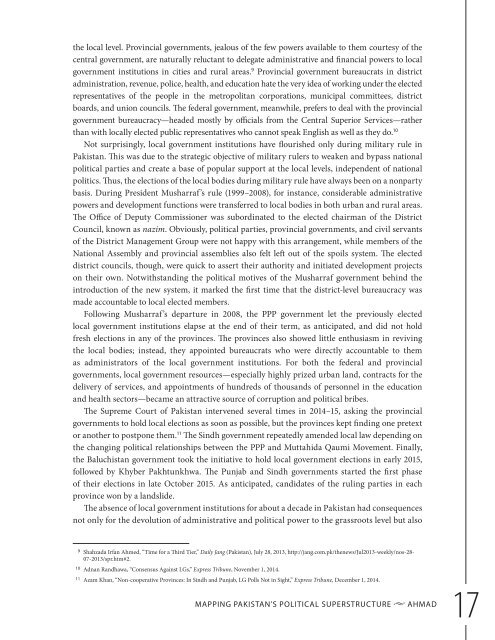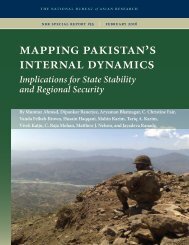pakistan’s
SR55_Mapping_Pakistan_February2016
SR55_Mapping_Pakistan_February2016
Create successful ePaper yourself
Turn your PDF publications into a flip-book with our unique Google optimized e-Paper software.
the local level. Provincial governments, jealous of the few powers available to them courtesy of the<br />
central government, are naturally reluctant to delegate administrative and financial powers to local<br />
government institutions in cities and rural areas. 9 Provincial government bureaucrats in district<br />
administration, revenue, police, health, and education hate the very idea of working under the elected<br />
representatives of the people in the metropolitan corporations, municipal committees, district<br />
boards, and union councils. The federal government, meanwhile, prefers to deal with the provincial<br />
government bureaucracy—headed mostly by officials from the Central Superior Services—rather<br />
than with locally elected public representatives who cannot speak English as well as they do. 10<br />
Not surprisingly, local government institutions have flourished only during military rule in<br />
Pakistan. This was due to the strategic objective of military rulers to weaken and bypass national<br />
political parties and create a base of popular support at the local levels, independent of national<br />
politics. Thus, the elections of the local bodies during military rule have always been on a nonparty<br />
basis. During President Musharraf’s rule (1999–2008), for instance, considerable administrative<br />
powers and development functions were transferred to local bodies in both urban and rural areas.<br />
The Office of Deputy Commissioner was subordinated to the elected chairman of the District<br />
Council, known as nazim. Obviously, political parties, provincial governments, and civil servants<br />
of the District Management Group were not happy with this arrangement, while members of the<br />
National Assembly and provincial assemblies also felt let out of the spoils system. The elected<br />
district councils, though, were quick to assert their authority and initiated development projects<br />
on their own. Notwithstanding the political motives of the Musharraf government behind the<br />
introduction of the new system, it marked the first time that the district-level bureaucracy was<br />
made accountable to local elected members.<br />
Following Musharraf’s departure in 2008, the PPP government let the previously elected<br />
local government institutions elapse at the end of their term, as anticipated, and did not hold<br />
fresh elections in any of the provinces. The provinces also showed little enthusiasm in reviving<br />
the local bodies; instead, they appointed bureaucrats who were directly accountable to them<br />
as administrators of the local government institutions. For both the federal and provincial<br />
governments, local government resources—especially highly prized urban land, contracts for the<br />
delivery of services, and appointments of hundreds of thousands of personnel in the education<br />
and health sectors—became an attractive source of corruption and political bribes.<br />
The Supreme Court of Pakistan intervened several times in 2014–15, asking the provincial<br />
governments to hold local elections as soon as possible, but the provinces kept finding one pretext<br />
or another to postpone them. 11 The Sindh government repeatedly amended local law depending on<br />
the changing political relationships between the PPP and Muttahida Qaumi Movement. Finally,<br />
the Baluchistan government took the initiative to hold local government elections in early 2015,<br />
followed by Khyber Pakhtunkhwa. The Punjab and Sindh governments started the first phase<br />
of their elections in late October 2015. As anticipated, candidates of the ruling parties in each<br />
province won by a landslide.<br />
The absence of local government institutions for about a decade in Pakistan had consequences<br />
not only for the devolution of administrative and political power to the grassroots level but also<br />
9 Shahzada Irfan Ahmed, “Time for a Third Tier,” Daily Jang (Pakistan), July 28, 2013, http://jang.com.pk/thenews/Jul2013-weekly/nos-28-<br />
07-2013/spr.htm#2.<br />
10 Adnan Randhawa, “Consensus Against LGs,” Express Tribune, November 1, 2014.<br />
11 Azam Khan, “Non-cooperative Provinces: In Sindh and Punjab, LG Polls Not in Sight,” Express Tribune, December 1, 2014.<br />
MAPPING PAKISTAN’S POLITICAL SUPERSTRUCTURE u AHMAD<br />
17



